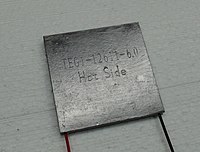
Photo from wikipedia
Thermoelectric materials enable the direct conversion of thermal to electrical energy. One application of this is ambient heat energy harvesting where relatively stable temperature gradients existing between the inside and… Click to show full abstract
Thermoelectric materials enable the direct conversion of thermal to electrical energy. One application of this is ambient heat energy harvesting where relatively stable temperature gradients existing between the inside and outside of a building could be utilized to produce electricity. Buildings can thus change from energy consumers to energy generators. This could ultimately help reduce the surface temperatures and energy consumption of buildings, especially in urban areas. In this paper, research work carried out on developing and characterizing a cement-based thermoelectric material is presented. Cement-based samples are doped with different metal oxides (Bi2O3 and Fe2O3) to enhance their thermoelectric properties, which are defined through their Seebeck coefficient, electrical conductivity and thermal conductivity. The study also discusses the positive impact of moisture content on the electrical conductivity
Journal Title: Polymers
Year Published: 2022
Link to full text (if available)
Share on Social Media: Sign Up to like & get
recommendations!